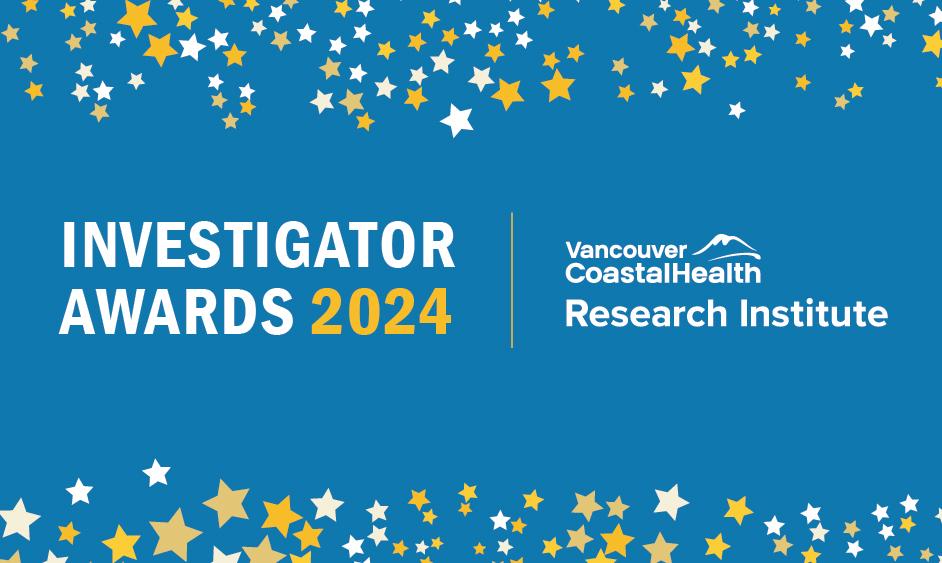
Congratulations to this year’s recipients of the Vancouver Coastal Health Research Institute Investigator Awards.
Vancouver Coastal Health Research Institute (VCHRI) facilitates clinician-scientists in their efforts to make new discoveries to improve the health and well-being of patients across their lifespan. The Investigator Awards provide salary support to leading health research investigators to help reduce their clinical commitments and expand their capacity for innovation-driven research that creates new health care knowledge.
The 2024 VCHRI Investigator Awards recipients are:
- Dr. Stefan Lang, clinical assistant professor in the Department of Neurosurgery at UBC
- Dr. Christina Luong, clinical assistant professor in the Department of Medicine at UBC
- Dr. Miles Mannas, assistant professor in the Department of Urologic Sciences at UBC
- Dr. Eric McGinnis, clinical assistant professor in the Department of Pathology and Laboratory Medicine at UBC
Can Deep Brain Stimulation help treat non-movement symptoms in patients with Parkinson’s disease?

Award: Mentored Clinician Scientist
Study: Network signatures of non-motor symptom outcomes following Deep Brain Stimulation in Parkinson’s disease
Parkinson's disease not only affects movement but also profoundly impacts emotions and cognitive functions, posing significant challenges for treatment. While therapies exist for motor symptoms, addressing emotional and cognitive issues, known as non-motor systems, remains elusive and greatly affects patients' quality of life.
Dr. Lang’s research focuses on Deep Brain Stimulation (DBS), a technique involving the implantation of electrodes deep within the brain to treat a dysfunctional circuits. While DBS effectively manages motor symptoms, its efficacy in alleviating non-motor issues varies. Dr. Lang's study aims to understand this variability by examining the relationship between electrode placement and specific brain circuits.
“We aim to pinpoint precise brain circuit engagement predictive of favourable non-movement outcomes,” says Dr. Lang. “This understanding will refine DBS treatment, offering new hope for the emotional and cognitive challenges faced by Parkinson’s patients.”
How can artificial intelligence transform the detection and classification of heart failure?

Award: Clinician Scientist
Study: High-precision Echo Assessment and Risk Triage of heart failure using Artificial Intelligence
Heart failure stands as one of the most prevalent cardiac conditions, a clinical syndrome associated with significant disability and mortality rates both in Canada and globally. Its prevalence escalates with age, with only a 50 per cent survival rate among patients within five years of diagnosis. Fortunately, there are many medical and device treatments that can improve symptoms and prognosis in patients with this condition.
Comprehensive echocardiography is the standard imaging modality for diagnosing heart failure. However, this test requires expert analysis of video and blood flow measurements, which limits access, particularly in remote settings. As the population ages, the demand for comprehensive echocardiography increases, resulting in prolonged wait times and significant delays in heart failure treatment.
In response to these challenges, Dr. Christina Luong’s research will empower technology for evaluating heart failure in both lab and point-of-care settings. Her solution includes automated detection of markers of heart failure and classification of left ventricular function through the integration of machine learning into ultrasound data analysis.
“We anticipate that our proposed technology will enable frontline physicians to perform point-of-care ultrasound in patients suspected of heart failure,” says Dr. Luong. “This will facilitate the triage of individuals who require comprehensive echocardiogram or specialized care from heart failure specialists, thereby streamlining the diagnostic process and ensuring timely intervention.”
Can stimulated Raman histology enhance prostate cancer diagnosis?

Award: Mentored Clinician Scientist
Study: Enhancing prostate cancer detection and treatment through stimulated Raman histology
Patients often experience increased anxiety while undergoing prostate cancer diagnosis due to invasive procedures and sometimes unnecessary biopsies. Dr. Mannas is introducing stimulated Raman histology (SRH), technology that could significantly improve the accuracy and speed of prostate cancer detection. Offering real-time, detailed images of prostate tissue, SRH outperforms traditional biopsy analysis, allowing for immediate visualization of cancer cells during diagnosis or treatment.
The study has two primary objectives: refining the precision of prostate biopsies with SRH, thus reducing the need for repeat procedures; and optimizing surgical outcomes by leveraging SRH to identify cancerous tissues during operations.
By delivering faster and more accurate diagnoses, SRH can reduce the waiting period and anxiety associated with cancer detection. It is expected to reduce unnecessary repeat biopsies, thereby enhancing the patient experience and reducing health care costs. Its capability of assisting surgeons in pinpointing and removing cancerous tissues during operations holds the potential for improved surgical outcomes and reduced cancer recurrence rates.
“Integration of this technology aims to streamline diagnostics, enhance surgical precision, and ultimately alleviate the burden on patients, resulting in better health outcomes and a more efficient health care system,” says Dr. Mannas.
Can optical genome mapping improve acute myeloid leukemia treatment strategies?

Award: Mentored Clinician Scientist
Study: Refining diagnosis and risk stratification in acute myeloid leukemia using high-resolution optical genome mapping
Acute myeloid leukemia (AML) is an aggressive blood and bone marrow cancer affecting around 1,000 Canadians each year. Despite an initial response to chemotherapy in many patients, AML often leads to relapse, resulting in low long-term survival rates. Genetic abnormalities within AML cells play a crucial role in determining treatment response and disease progression. However, current genetic testing methods fall short in detecting subtle abnormalities, hindering accurate risk assessment and treatment selection.
A newly developed technology known as optical genome mapping (OGM) can detect genetic abnormalities with up to 1,000 times greater resolution than current standard testing. OGM has recently been implemented as the front-line test to guide treatment of patients with AML at Vancouver General Hospital.
Dr. McGinnis’ study aims to systematically evaluate genetic abnormalities in patients with AML using OGM, with a dual objective: to identify predictive markers of relapse and treatment response to refine treatment strategies; and to uncover unknown genetic alterations driving AML development. This comprehensive approach could tailor highly targeted therapies to specific genetic subtypes of AML, potentially revolutionizing treatment models and improving patient outcomes.
“Through systematic exploration of the connection between genetic abnormalities identified via OGM and patient outcomes in AML, this research holds promise for enhancing treatment approaches for AML patients in British Columbia and beyond,” says Dr. McGinnis.


